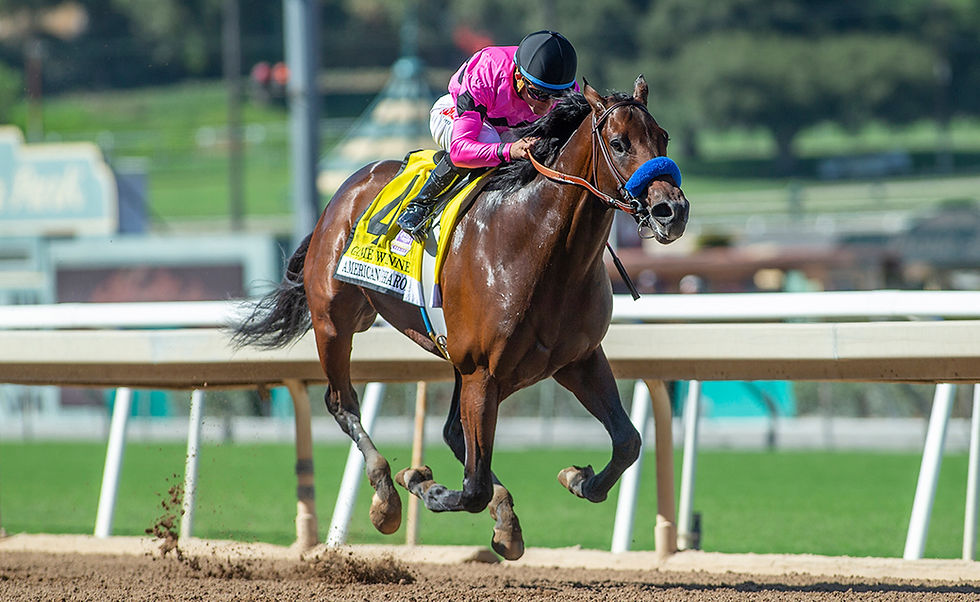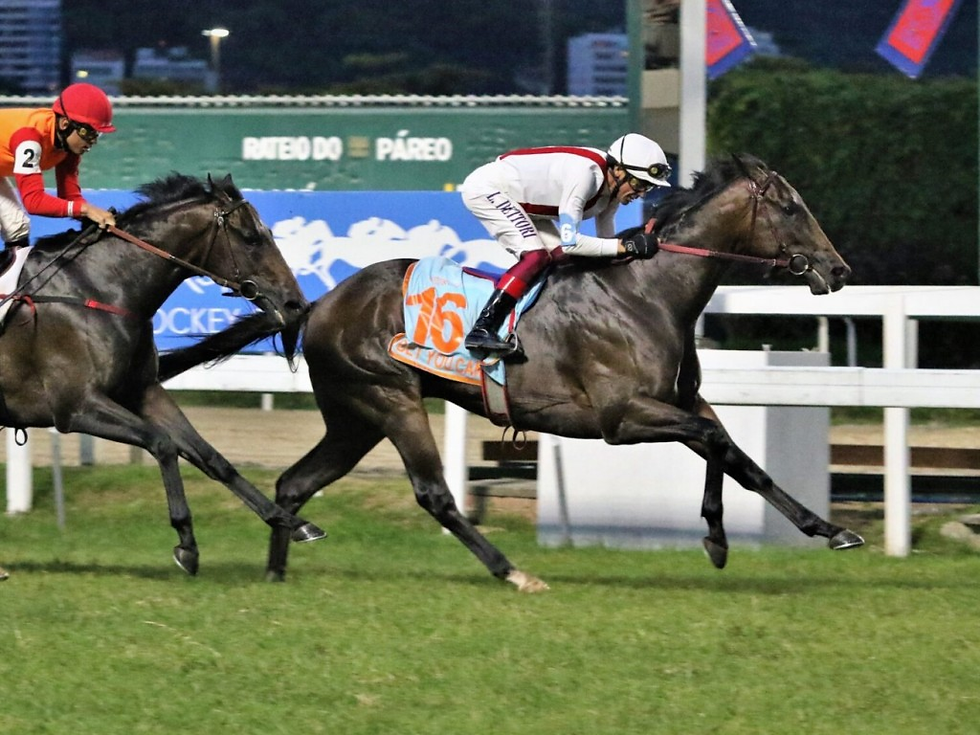Game Winner arrives in Brazil as a representative of Candy Ride’s sire line
- Lineage Bloodstock
- Aug 1, 2025
- 5 min read
Updated: Aug 4, 2025
The news that U.S. champion Game Winner (Candy Ride) has just arrived at Fazenda Mondesir, in Bagé (Rio Grande do Sul, Brazil), shook South American turf. This is the first Eclipse Award-winning 2-year-old of the Candy Ride era to cross the equator to stand at stud in Brazil, and he’s doing so at one of the country’s most historic farms, a pioneer in the importation of elite bloodlines. The champion will stand for the 2025 and 2026 Southern Hemisphere breeding seasons, with limited bookings for outside mares. He is currently undergoing quarantine to begin covering just in time for peak breeding season in the Southern Cone.

Fazenda Mondesir, located in the heart of the breeding hub of Rio Grande do Sul, has established itself as a destination for top stallions, following the successful stints of Ghadeer (Lyphard) in the 1980s and more recently Agnes Gold (Deep Impact). The arrival of Game Winner strengthens the farm’s strategy of blending American speed lines with the European stamina influence already present in its roster through Outstrip, who is showing strong numbers from his first crop. Other notable stallions to have stood at Mondesir include Duke of Marmalade (Vaguely Noble), Free Hand (Gallant Man), Mark of Esteem (Darshaan), Gilded Time (Timeless Moment), shuttle stallion Shanghai Bobby (Harlan’s Holiday) in 2014, and Brazil’s champion miler of the 2020–21 season, Olympic Jhonsnow (Agnes Gold). The stallion operation, currently overseen by Dr. Paulo Bergamo with assistance from Dr. Luan Kickofel, has seen numerous top-class sires, and all signs suggest that trend will continue.
Game Winner was sold as a yearling for $110,000 at the 2017 Keeneland September Sale by Lane’s End, purchased by agent Ben Glass. A son of Argentine champion Candy Ride and the A.P. Indy mare Indyan Giving, Game Winner was crowned U.S. Champion 2-Year-Old Male in 2018 after going undefeated in four starts, including three consecutive Grade 1 wins: the Del Mar Futurity, American Pharoah Stakes, and the Breeders’ Cup Juvenile; a nearly impossible streak to achieve. He retired with earnings of over $2 million after also winning the Los Alamitos Derby (G3), and finishing second in the Rebel Stakes (G2) and Santa Anita Derby (G1). He was fifth in the Kentucky Derby, beaten just 3½ lengths after a troubled trip. This rare combination of early speed and mile-plus stamina is exactly what Brazilian breeders are seeking to inject into their grass-oriented broodmare base.
Retired to Lane’s End in 2021, Game Winner debuted as a top-10 freshman sire in 2024 with 13 winners, including G1 winner Gaming. In 2025, he added “TDN Rising Star” filly Maysam and recent Del Mar black-type winner Game Warrior. In April, at Keeneland, his son Will to Prepare broke his maiden impressively on debut for trainer Cherie DeVaux. He now has 21 winners, placing him fifth among second-crop sires by earnings. His progeny show Candy Ride’s long hindquarters and the powerful stride typical of A.P. Indy, traits that have produced a 55% winners-to-starters rate, well above the average for U.S. stallions.
Lane’s End launched Game Winner at a fee of $30,000 (stands & nurses), covering 131 mares in 2022, representing potential gross revenue of nearly $3.9 million. In 2023, he stood for the same fee and covered 96 mares, while in 2024 the fee dropped to $20,000, with 62 mares covered, still generating over $1.2 million in annual revenue. His first yearlings sold for up to $280,000, and the first 16 mares in foal to him sold for an average of $250,000, comfortably allowing Lane’s End to recoup its investment and establish him as a “value sire” in the $20,000 range.
Brazil lacks direct representatives of Candy Ride capable of combining precocity with dirt performance, a surface with limited relevance in Brazil. Game Winner fills that gap as the first son of the Argentine champion to stand there. His pedigree is free of Northern Dancer in the first five generations, offering a perfect outcross for mares descended from Drosselmeyer, Agnes Gold, or Wild Event, all of which are widespread in the region. His commercial appeal also makes each mating a dual investment: elite genetics and yearling resale potential in the U.S. market, where Southern Hemisphere-bred runners are gaining traction. If he performs in Bagé as he did in Kentucky, Game Winner could become a major draw for Argentine and Uruguayan breeders who already send mares to Rio Grande do Sul in search of top international bloodlines.
The Candy Ride × A.P. Indy nick is known for its success (12% black-type winners from runners), potentially explained by the 4x6 Rasmussen Factor on Alanesian (Polynesian) generated by this cross. The Argentine stallion carries Alanesian in the 4th generation via Herbalesian, dam of his sire Ride the Rails. Meanwhile, A.P. Indy (Seattle Slew) repeats her in the 6th generation through Boldnesian, sire of Bold Reasoning and grandsire of Seattle Slew. The cross also avoids close Northern Dancer inbreeding, and has Mr. Prospector just once in early generations, leaving “genetic space” to add those lines via the dam without excessive inbreeding. The result is a practical equation: precocity + stamina + effectiveness.
The 1-x branch of La Troienne culminating in Game Winner is an example of a “genetic staircase”: each generation adds either speed or stamina without losing the strength and fertility established by the great matron. It begins with Baby League and her daughter Striking, who contributed the toughness of War Admiral, continues with Batter Up (Tom Fool) and Bravissimo (Bold Ruler), and peaks with Bravo Native (Restless Native), a modest runner but dam of stakes-winner Cherokee Wonder and granddam of millionaire Cherokees Boy.

Though Game Winner will be based at the farm owned by Brazil’s traditional turf family, Peixoto de Castro, several top breeding operations have come together to make this project a reality for Brazilian racing. The region’s most influential breeders have joined the initiative: Haras Legacy, formerly H&R; dominant statistical leader Haras Santa Maria de Araras; Eternamente Rio and its veterinarian Dr. Raúl, who is enthusiastic about Candy Ride’s arrival in Brazil; JCR; the breeder/owner of Sinsel (Alpha), recent Gran Premio Brasil winner and generation leader, Stud Red Rafa; Haras Fronteira and Estrela Nova (home to Arrocha and Taareef); Stud Embalagem; Haras Anderson, breeder of Night of Rose, winner of the last G.P. Seabra; Atafona; Haras Belmont,currently excelling in Paraná; Haras Clark Leite; Haras Cuatro Piedras from Uruguay, led by Dr. Ulisses Lignon Carneiro; Stud Hulk; Mondesir itself; Haras Do Morro; Haras Old Friends, owned by ABCPCC president Julinho Camargo; Stud Quintella; Santa Rita da Serra, enjoying good results with Sangarius; and Haras Di Cellius in Bagé, run by Dr. Igor Kickofel. These 20 participants will support Game Winner over the next two breeding seasons in Brazil.
We believe Game Winner will have great success in Brazil. The Candy Ride line has already succeeded in Argentina with Señor Candy, in Uruguay with Sloane Avenue, in the U.S. with Gun Runner, and continues to grow with Vekoma and current freshman sire Rock Your World. Why wouldn’t the same success happen in Brazil? Backed by solid commercial performance in the demanding U.S. market, already a G1-producing stallion, and supported by twenty top breeding farms in the region, Game Winner has all the ingredients to replicate Candy Ride’s legacy in the Southern Cone. If his breeding program is executed as planned, Brazil will take another major step toward filling its genetic pool’s gap in speed and precocity.











Comments